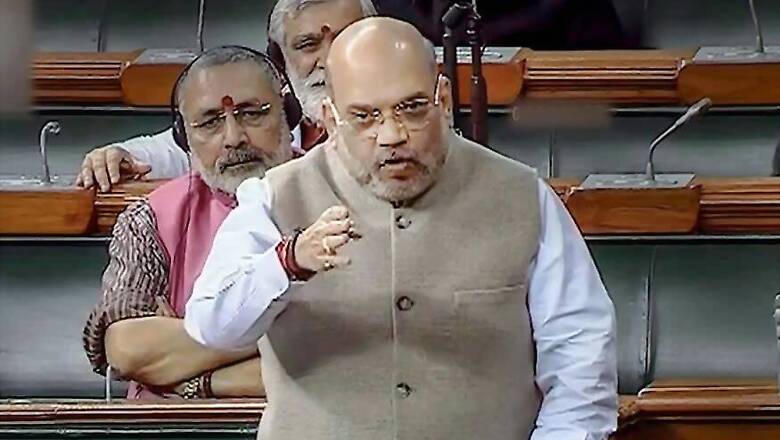
views
New Delhi: The Rajya Sabha on Wednesday approved the Citizenship (Amendment) Bill (CAB), completing the legislative procedure for giving Indian citizenship to non-Muslim migrants from Pakistan, Afghanistan and Bangladesh.
Replying to a six-and-a-half-hour debate on the Bill, Union Home Minister Amit Shah said the legislation seeks to provide citizenship to persecuted minorities in the three countries and not take away citizenship of anyone. He rejected the Opposition charge that the Bill was against Muslims and said they have nothing to fear.
The Bill was passed with 125 votes in favour and 105 against it. Besides BJP, its allies such as the Janata Dal (United) (JDU) and Shiromani Akali Dal (SAD), the legislation was supported by the All India Anna Dravida Munnetra Kazhagam (AIADMK), Biju Janata Dal (BJD), Telugu Desam Party (TDP) and the YSR Congress.
The legislation sailed through even as Assam and its neighbouring states in the Northeast witnessed intense protests on Wednesday over the hugely emotive
Bill. Guwahati was placed under indefinite curfew and mobile internet services were cut off for 24 hours beginning 7 pm on Wednesday, with Tripura already facing a 48-hour internet blockade.
The House earlier rejected motions to send the Bill to a select committee, with 124 members voting against it as compared to 99 in its favour. It also rejected several amendments moved by opposition members, most by voice vote.
The Bill was passed by Lok Sabha on Monday. It will now go to the President for his assent.
Prime Minister Narendra Modi described the Bill’s passage as a "landmark day" for India and its ethos of compassion and brotherhood. The Bill will "alleviate sufferings of many who faced persecution for years", he wrote on Twitter.
Modi also expressed gratitude to all members of Rajya Sabha who voted in favour.
The BJP cheered the passage of the Bill, with its top leaders hailing the proposed law as a "historic" legislation that has made the dreams of crores of deprived and victimised people come "true".
Soon after the passage, Shah said in a tweet: “Grateful to PM Narendra Modi for his resolve to ensure dignity and safety for these affected people. I thank everyone for their support."
BJP working president JP Nadda called it a historic legislation that will do justice to the minorities of the neighbouring countries who faced religious persecution. It will provide minorities from Pakistan, Bangladesh and Afghanistan facing religious persecution an opportunity to lead a dignified life in India, he said.
"These minorities of the neighbouring country were displaced, and have been facing the brunt of injustice for a long time. They got justice today through the efforts of the Modi government," he said.
Union minister and former BJP president Nitin Gadkari said the Bill, which is set to become part of the citizenship law, will be a source of strength for the deprived.
However, Congress president Sonia Gandhi said it marks a "dark day" in the constitutional history of India and is a "victory of narrow-minded and bigoted forces" over the country's pluralism.
In a strongly-worded statement issued immediately after the Bill was passed, Gandhi said the bill is not just an affront to the eternal principles of equality and religious non-discrimination that have been enshrined in the Constitution, but represents a rejection of an India that would be a free nation for all her people, irrespective of religion, region, caste, creed, language or ethnicity.
"The Bill fundamentally challenges the idea of India that our forefathers fought for and, in its place, creates a disturbed, distorted and divided India where religion will become a determinant of nationhood," she said.
Bill not anti-Muslim, Shah tells House
On why persecuted minorities from countries such as Sri Lanka were not part of the legislation, Amit Shah said Tamils from the island country had been given Indian citizenship in the past and the present law is to tackle a specific problem.
To repeated questions from opposition of Muslims being left out, Shah said Muslims from other countries have the right to apply for Indian citizenship as per existing rules. As many as 566 Muslims have been given citizenship, he said.
Shah attacked the Congress, saying statements by its leaders match those of Pakistani leaders on not just the Citizenship Bill but also on scrapping of Article 370.
Asserting that neither the Citizenship Bill, nor the previously passed legislation making the practice of triple talaq punishable and the scrapping of Article 370 are anti-Muslim, he said the present legislation is to give citizenship and does not to take away citizenship of anyone.
Indian Muslims are citizens of the country and will remain so, he said, adding, "Citizenship of Indian Muslims is not being taken away. The Citizenship Bill is not to snatch anyone's Indian citizenship. Muslims have no need to fear or worry."
Shah said the Bill seeks to correct the wrong done by the partition of the country on religious lines. He went on to attack the Congress for alleged double speak on the issue, saying the party had during its rule given Indian citizenship to 13,000 Hindus and Sikhs from Pakistan without raising a word about the same for other communities.
Shah reiterated that the Bill does not violate Article 14 of the Constitution as it does not prohibit laws based on reasonable classification.
Opposition attacks BJP government
The Opposition in the Rajya Sabha tore into the government, terming the Bill as "unconstitutional", "divisive" and an assault on the democratic and secular fabric of the nation.
The Upper House witnessed strong opposition to the Bill from the Congress, Shiv Sena, Nationalist Congress Party (NCP), Dravida Munnetra Kazhagam (DMK), Bahujan Samaj Party (BSP), Rashtriya Janta Dal (RJD), Janata Dal (Secular), Aam Aadmi Party (AAP), Marumalarchi Dravida Munnetra Kazhagam (MDMK), Telangana Rashtra Samithi (TRS), Indian Union Muslim League (IUML) during the debate.
The opposition parties wanted the Bill to be sent to the Select Committee of the House, but the motion was defeated with 124 votes against it and 99 in favour.
Launching a scathing attack on the government, Leader of Opposition in the House Ghulam Nabi Azad demanded to know why the entire Northeast, including Assam, Tripura, Arunachal Pradesh, Meghalaya and Nagaland, was burning at the moment if people were happy about the proposed legislation.
Senior Congress leader P Chidambaram termed the Bill a slap on the face of Parliament, charging the government with "wrecking and demolishing" the Constitution through it and expressed confidence that the judiciary would strike down the law.
"This (Bill) is a slap on the face of Parliament. I am afraid this government is ramming through (with) this Bill in order to advance its Hindutva agenda...This is a sad day," he said.
Congress leader Kapil Sibal accused the government for giving a legal colour to the "two-nation theory" and urged it not to convert "Indian republic into a Jurassic republic where there are two dinosaurs".
Senior Congress leader Anand Sharma termed the proposed legislation as unconstitutional and said the manifesto of any political party cannot override the Constitution.
He termed the Bill as an assault on the foundational values of Constitution and added "it hurts the soul of republic of India."
The Sena, which voted in favour of the controversial Bill in Lok Sabha, opposed it in the Upper House, saying the draft law should have been debated on the basis of "humanity not religion".
(With inputs from PTI)



















Comments
0 comment